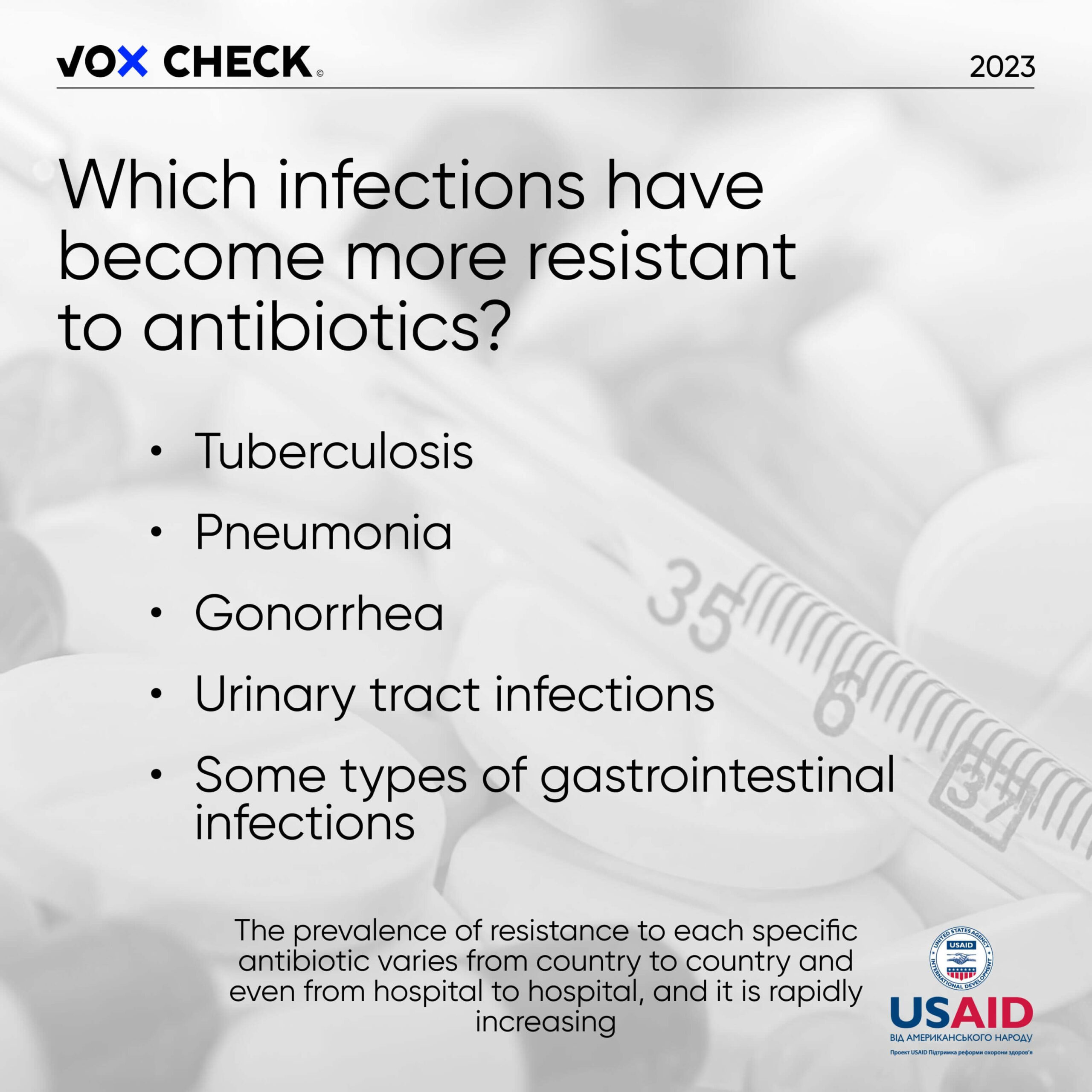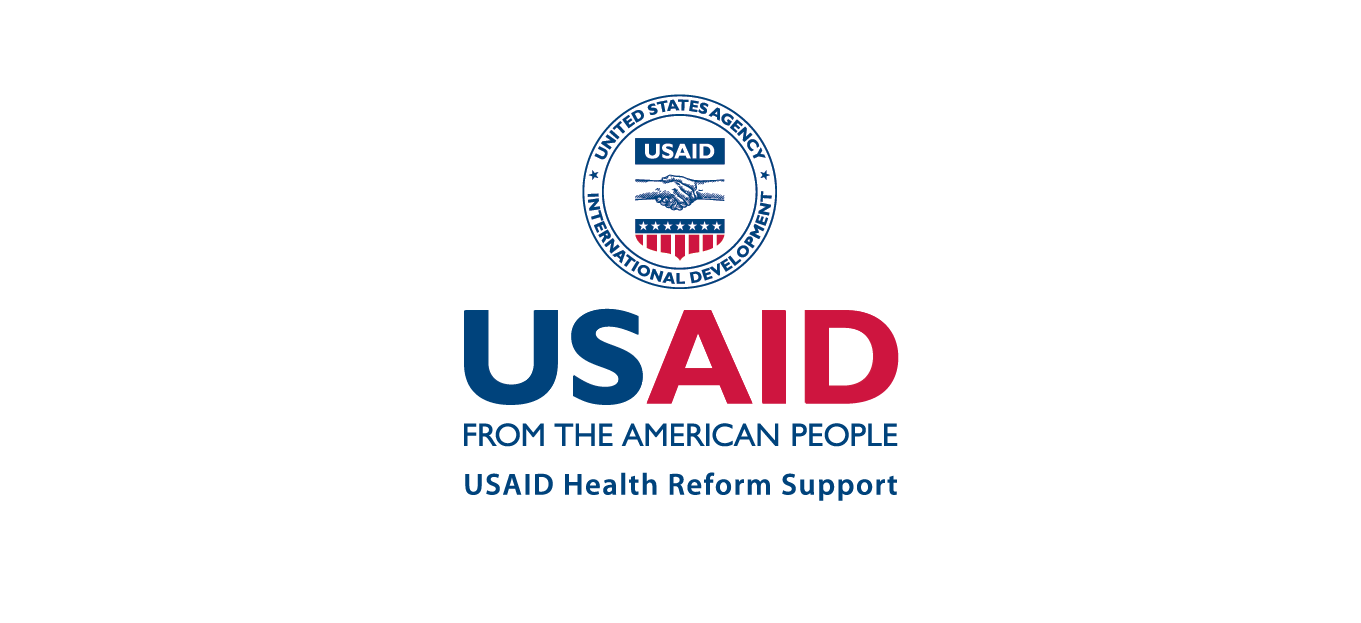The development of antibiotic resistance is a global problem, and all countries are currently trying to counteract it. Bacteria are becoming more resistant, affecting the treatment of bacterial infections and increasing the risks of complications during surgical interventions. The improper or excessive use of antibiotics is a leading cause of the increased resistance of bacteria. War adds additional risks, as it involves an increase in the number of wounded, the destruction of medical infrastructure, and impulsive decision-making. Therefore, global organizations openly communicate about the problem and offer assistance to Ukraine in reducing the risks of antibiotic resistance spread. In contrast, Russian propagandists blame “American labs” and their “experiments” for everything.
With the support of the USAID Health Reform Support project, VoxCheck analyzes and refutes public health narratives spread in the information space of Ukraine, Belarus, and russia on a weekly basis.
There is information circulating online, stating that allegedly the Centers for Disease Control and Prevention (CDC) in the United States have reported that Ukrainians are importing dangerous superbugs to Europe. Swedish researchers from Lund University found that every tenth Ukrainian is infected with pathogenic superbugs. Russian propagandists also link this to the work of “American biolabs” in Ukraine, claiming that the United States initially armed, then incited, and in the process conducted experiments on insane or simply bought Ukrainians for their research. Now, the “consequences of their activities” are supposedly beginning to emerge.
What’s the reality?
Superbugs are microbes resistant to antibiotics. On December 8, 2023, the CDC indeed published information about the spread of antibiotic-resistant bacteria in Ukraine due to the war. In 2022, the organization, along with the Public Health Center of Ukraine, the European Regional Bureau of the World Health Organization (WHO), and other international partners, as well as local healthcare institutions, assessed the work of specific diagnostic laboratories in Ukraine. These evaluations focused on six diagnostic and prevention laboratories in the Ternopil, Khmelnytskyi, and Vinnytsia regions.
Any conspiracy theories about conducting “experiments on people” in these laboratories are unfounded. The scope of their tasks involves epidemiological surveillance, including antibiotic resistance monitoring, disease monitoring and prevention, as well as providing diagnostic services.
CDC experts noted insufficient automated microbiological equipment and consumables for antibiotic susceptibility testing. Additionally, through patient surveys of those infected in these hospitals (50 respondents), they found high rates of antibiotic resistance. In 60% of cases, the infection was caused by resistant bacteria. Currently, the organization, together with local and international partners, is taking the following actions to improve the situation, starting with the Ternopil, Khmelnytskyi, and Vinnytsia regions:
- Modernization of laboratory equipment and workflows.
- Increasing accessibility and use of hand hygiene products, as well as providing technical training for staff.
- Issuing clinical recommendations for indications for bacteriological research, including military hospitals.
- Educational programs involving clinical and laboratory work between international experts in antimicrobial resistance and Ukrainian clinicians and laboratory specialists.
- Seminars on the development and use of clinical and laboratory standard operating procedures to enhance infection prevention and control, as well as clinical treatment for infected patients.
- Provision of additional laboratory materials.
Overall, the material analyzed the issue of antibiotic resistance among Ukrainian patients and explored ways to address this problem specifically within Ukraine. To describe the issue, the authors do mention a German case from 2022, where an increase in cases of infections caused by the superbug Klebsiella pneumoniae was recorded. Superbugs refer to microbes that are resistant to antibiotics. A significant portion of the identified patients had previously been in Ukraine. However, it is emphasized that antibiotic resistance is a global problem that has existed for several years.
The propagandists also mention research by Swedish researchers from Lund University. Scientists monitored the prevalence of drug-resistant infections in three Ukrainian hospitals from February to September 2022. Depending on the type of bacteria, the levels of resistance ranged from 18% to 95%. The conclusion that every tenth Ukrainian is infected with superbugs is not stated in their findings.
As explained by the World Health Organization (WHO), the development of resistance to antimicrobial agents is a natural process that occurs over time due to genetic changes in pathogens. Human activities, particularly the improper and excessive use of antimicrobial agents for the treatment, prevention, or control of infections in humans, animals, and plants, accelerate its emergence and spread. With each misuse of an antimicrobial agent, some bacteria survive. They continue to reproduce, and the new generation of these bacteria becomes resistant to that antibiotic.
To combat resistance worldwide, countries adopted the Global Action Plan (GAP) in 2015 and committed to developing and implementing multisectoral national action plans. As of November 2023, 178 countries, including Ukraine, have developed national plans. Ukraine initially approved its corresponding plan in 2019, but new risks associated with the war necessitated a new plan. Therefore, the Ministry of Health of Ukraine has developed a new National Action Plan to combat antimicrobial resistance, which includes expanding the national network of microbiological laboratories and strengthening the infectious control system at healthcare facilities, as well as surveillance of resistant pathogens.
Yes, since the beginning of the full-scale war, the problem of antimicrobial resistance has intensified due to the increased number of casualties. Contributing factors to the development of resistance include the excessive and irrational use of antibiotics for preventive and therapeutic purposes (especially during the COVID-19 pandemic), self-administration of antibacterial drugs without a doctor’s prescription, the inability to observe minimum hygiene requirements in frontline areas, and the overload of the medical system. Additionally, a significant quantity of antibacterial drugs arrives through humanitarian aid, and the control over their use is quite limited. The use of these antibiotics without laboratory confirmation of their appropriateness is extremely dangerous, as resistance to them develops more rapidly.
Source: Ministry of Health of Ukraine
To counteract this, the Ministry of Health of Ukraine has made changes to the Standard of Medical Care “Rational Use of Antibacterial and Antifungal Drugs for Therapeutic and Prophylactic Purposes.” Specifically, drugs with high resistance have been classified as reserved, prohibiting their use for prophylaxis. The principles for choosing antibiotics have also been updated, prescribing antibiotics with a lower risk of resistance development.
Another tool to control the uncontrolled dispensing and use of antibiotics is the introduction of electronic prescriptions for them since August 2022. Since then, 933 thousand electronic prescriptions for antibiotics have been issued. An electronic prescription can be obtained from any doctor, regardless of whether there is a declaration with a family doctor.
This information piece was produced with the assistance of the United States Agency for International Development (USAID), provided on behalf of the people of the United States of America. This article’s content, which does not necessarily reflect the views of USAID, the United States Government, is the sole responsibility of Deloitte Consulting under contract #72012118C00001.
Attention
Авторы не работают, не консультируют, не владеют акциями и не получают финансирования от компании или организации, которая бы имела пользу от этой статьи, а также никоим образом с ними не связаны





